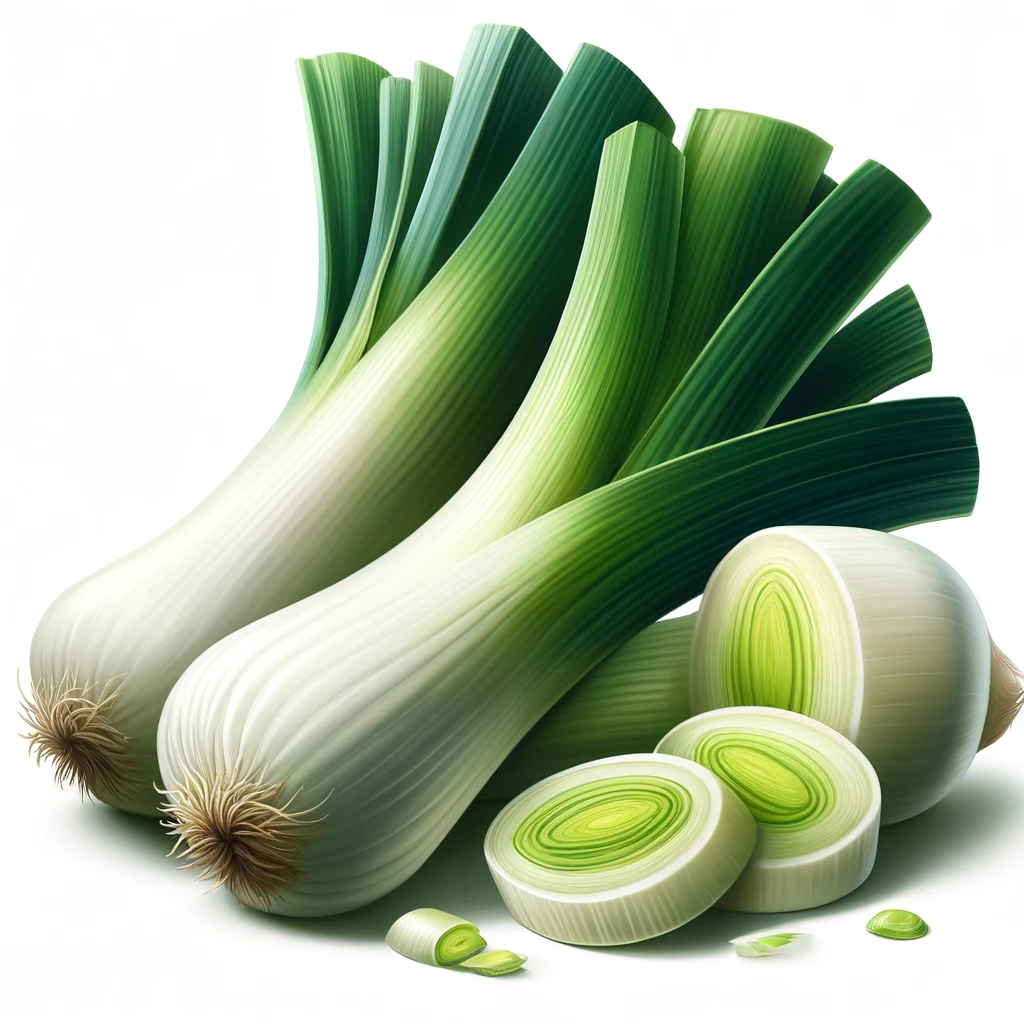Leeks, with their mild onion-like flavor and versatility in cooking, are often overlooked despite their impressive nutritional profile and numerous health benefits. This blog post aims to explore the nutritional content of leeks, their positive impacts on human health, and why they should be included in a balanced diet for optimal well-being.
Nutritional Content of Leeks
Leeks are packed with essential vitamins, minerals, and phytonutrients that contribute to their health-promoting properties. Here’s a breakdown of the nutritional content per 100 grams of raw leeks:
- Vitamins:
- Vitamin A: Supports vision, immune function, and skin health.
- Vitamin C: Boosts the immune system, aids in collagen production, and acts as an antioxidant.
- Vitamin K: Essential for blood clotting and bone health.
- Vitamin B6: Important for brain function and the synthesis of neurotransmitters.
- Folate (Vitamin B9): Crucial for DNA synthesis and cell division.
- Minerals:
- Potassium: Helps regulate blood pressure, muscle contractions, and nerve signals.
- Calcium: Vital for bone health and muscle function.
- Magnesium: Involved in energy metabolism, muscle function, and nerve transmission.
- Iron: Necessary for oxygen transport in the blood and overall energy production.
- Phytonutrients:
- Flavonoids: Including kaempferol and quercetin, which have antioxidant and anti-inflammatory properties.
- Sulfur compounds: Known for their potential anti-cancer effects and support for liver health.
- Macronutrients:
- Calories: 61
- Carbohydrates: 14.1 grams
- Protein: 1.5 grams
- Fat: 0.3 grams
- Fiber: 1.8 grams
Health Benefits of Leeks
- Supports Heart Health: The combination of potassium, which helps regulate blood pressure, and flavonoids, which have antioxidant properties, contributes to cardiovascular health. Regular consumption of leeks may help lower the risk of heart disease.
- Boosts Immune Function: The high content of vitamin C in leeks supports immune function by stimulating the production of white blood cells and antibodies. This vitamin also helps protect cells from damage caused by free radicals.
- Aids in Digestive Health: Leeks are a good source of fiber, which supports digestive health by promoting regular bowel movements and preventing constipation. Fiber also nourishes beneficial gut bacteria, contributing to a healthy gut microbiome.
- Promotes Bone Health: Vitamin K in leeks plays a crucial role in bone metabolism and helps maintain bone density. Adequate intake of vitamin K is associated with a reduced risk of fractures and osteoporosis.
- Anti-inflammatory Properties: The presence of kaempferol and quercetin in leeks provides anti-inflammatory benefits, which may help alleviate symptoms of inflammatory conditions such as arthritis and promote overall joint health.
- Supports Vision: Vitamin A, found in leeks, is essential for maintaining healthy vision and preventing eye disorders. It supports the function of the retina and contributes to good night vision.
- May Reduce Cancer Risk: Sulfur compounds in leeks, such as allyl sulfides, have shown potential anti-cancer effects by promoting detoxification processes in the liver and inhibiting the growth of cancer cells.
Culinary Tips and Considerations
To enjoy the health benefits of leeks, consider these culinary tips:
- Soups and Stews: Add chopped leeks to soups and stews for a delicate onion-like flavor and nutritional boost.
- Salads: Include thinly sliced raw leeks in salads for a crisp texture and mild onion taste.
- Sautéed or Roasted: Sauté or roast leeks with olive oil and herbs as a flavorful side dish or topping for meats and fish.
- Quiches and Frittatas: Incorporate leeks into quiches, frittatas, or omelets for added flavor and nutrients.
Conclusion
Incorporating leeks into your diet is a simple and delicious way to enhance your nutritional intake and support overall health. Whether you enjoy them raw in salads, cooked in soups, or as a side dish, leeks offer a plethora of vitamins, minerals, and phytonutrients that promote cardiovascular health, boost immunity, support bone strength, and provide anti-inflammatory benefits.
Next time you’re planning your meals, consider adding leeks to the shopping list. Their unique flavor and nutritional benefits make them a valuable addition to any culinary repertoire and a key ingredient in promoting your best nutritional outcomes and overall well-being.





